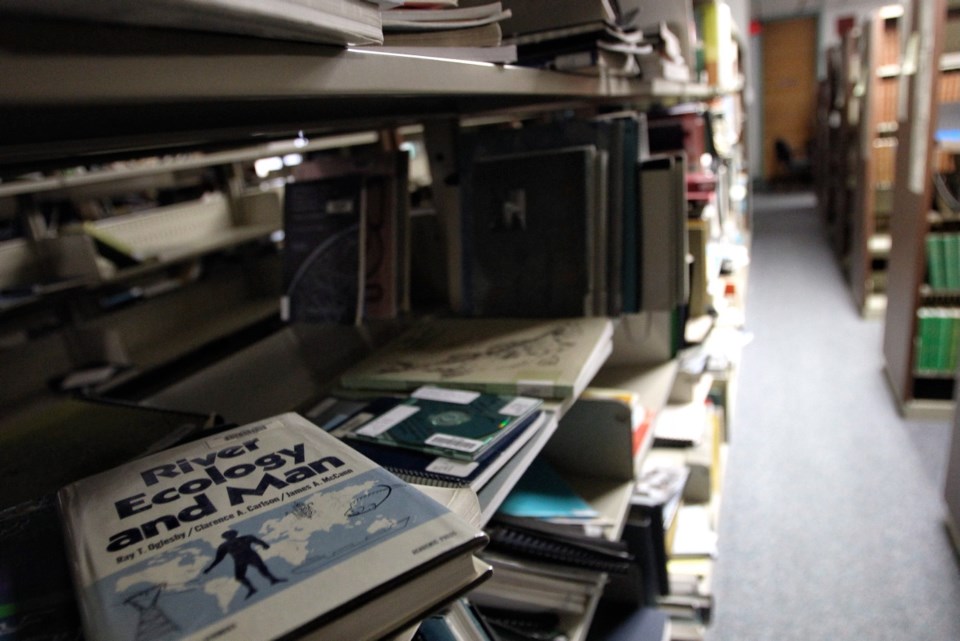 When the feds gutted the Winnipeg library bearing Eric Marshall’s name, it broke the Cowichan Bay man’s heart.
When the feds gutted the Winnipeg library bearing Eric Marshall’s name, it broke the Cowichan Bay man’s heart.
Having built up a world-class scientific research collection, he couldn’t bear to be associated with its picked-over skeleton. Pull down the sign at the entrance, the 83-year-old told his son last week.
“I said, ‘Take a little crowbar with you and prise it off the wall,’ ” Marshall said Tuesday, “but they wouldn’t let him do it.”
The fate of the Eric Marshall Aquatic Research Library at the Freshwater Institute on the University of Manitoba campus is at the heart of a growing political firestorm. It’s one of seven regional Department of Fisheries and Oceans libraries being lost to Ottawa’s cost-cutting.
Critics call the closing of federal libraries a scandal. They accuse the Harper government of clumsily destroying a knowledge bank that can never be replaced.
The brouhaha forced federal Fisheries Minister Gail Shea to issue a statement Tuesday rebutting what she called the spread of serious misinformation, including the allegation that government had actually burned some books.
Marshall remains aghast. “I spent 25 years building up probably the best library in North America on freshwater aquatic research, and now the government is just shutting it down,” he says. “Most of it was bought with taxpayers’ money.”
Marshall would have liked to press Stephen Harper on the matter when the prime minister appeared just down the coast at Brentwood College on Tuesday. “I would ask him why he’s stifling environmental research by laying off staff in DFO, cramping those who are left, removing their libraries.” The Conservatives see little value in science that doesn’t lend itself to the exploitation of natural resources, he says.
Marshall was a science librarian in England before being recruited to Canada in 1967 with the mandate to build a top-notch library. He carefully assembled a collection scientists found invaluable, one packed with esoterica ranging from 19th-century fisheries data (important for setting a baseline for research), to back issues of important journals, to supplementary reports to the Mackenzie Valley pipeline hearings of the 1970s.
After Marshall retired in 1992, the library was named in his honour.
Then came word last year that DFO’s 11 libraries were being pared to two — including the one at Sidney’s Institute of Ocean Sciences — plus a couple of repositories for coast guard materials.
The move is supposed to save $443,000 this year. “Users of these libraries clearly prefer to access its information digitally, which the Department of Fisheries and Oceans can accommodate while also saving taxpayers money,” Shea’s statement said. “In 2011, for example, over 95 per cent of the total documents provided to users were provided digitally through self-service or library-staff virtually assisted service.”
“All materials for which DFO has copyright will be preserved by the department,” she continued. “Duplicate materials, including books, from the libraries being consolidated were offered to other libraries and third parties if they wanted them. They were also offered to the DFO staff on site at the library, then offered to the general public, and finally were recycled in a ‘green’ fashion, if there were no takers. It is absolutely false to insinuate that any books were burnt.”
That’s in sharp contrast to the picture painted on the Unmuzzled Science blog, written by someone who describes himself as a Canadian government scientist: “While the department has issued numerous statements indicating that the material in the library is digitized, and ‘rare’ texts are being consolidated at other institutions, the fact of the matter is that when the current librarian retired in July, she was nowhere near completed her task of digitizing material or of even simply cataloguing what was held at the library, and the ‘closure’ at this particular facility has been a total gong-show.”
That’s the version Marshall has heard, too. Much of his collection went to Sidney, but much of what was left was simply scooped up by anyone who wanted to help themselves at the end of November.
“They more or less had a rummage sale,” Marshall says. “A consulting company in Winnipeg made off with a couple of truckloads.”
There’s no way of knowing who took what documents. “As far as I can see, no records were kept.” Similar stories are heard from other libraries.
It’s folly to think research won’t be hurt, Marshall says. Instead of having documents at their fingertips, scientists at Nanaimo’s Pacific Biological Station must now call Sidney to have someone find and send the documents they need. There’ll be no more browsing, stumbling across helpful information they didn’t know existed.
Some precious national knowledge will simply be gone. For example, Marshall collected Arctic explorers’ reports, which often contained casually mentioned incidental information — the abundance of char in a certain river, say — that current scientists found useful. “That sort of stuff isn’t going to be digitized.”
At 83, seeing his life’s work gone is hard to take.
“Somebody compared the closing of my library to the Romans trashing the royal library in Alexandria.”
- - - - - - - - - - - - - -
Link to the Unmuzzled Science blog: http://unmuzzledscience.wordpress.com/2013/12/24/dfo-provides-christmas-gifts-for-scientists/
Link to Fisheries Minister Gail Shea's statement on library consolidation: http://www.dfo-mpo.gc.ca/media/npress-communique/2014/20140107-en.html



